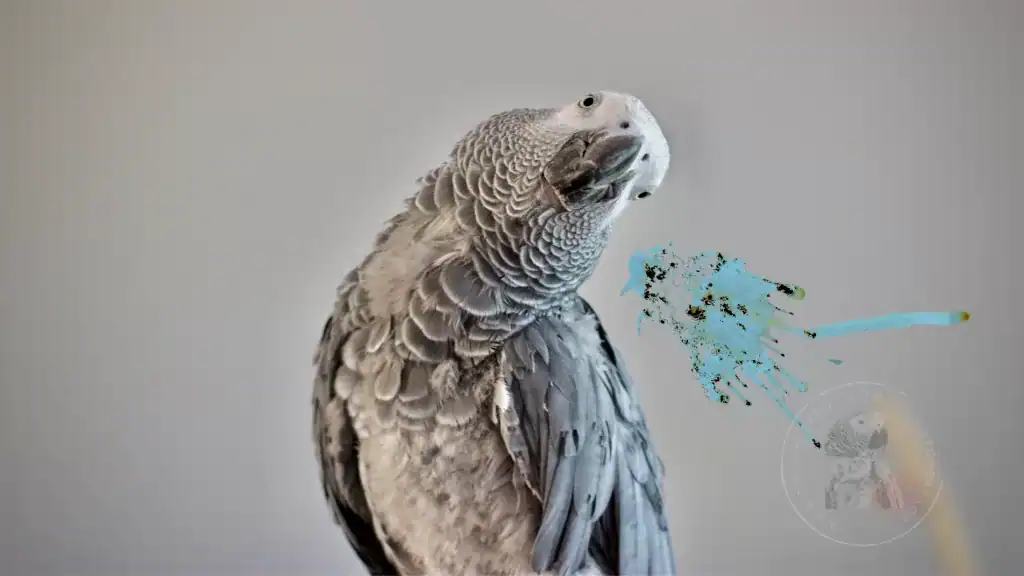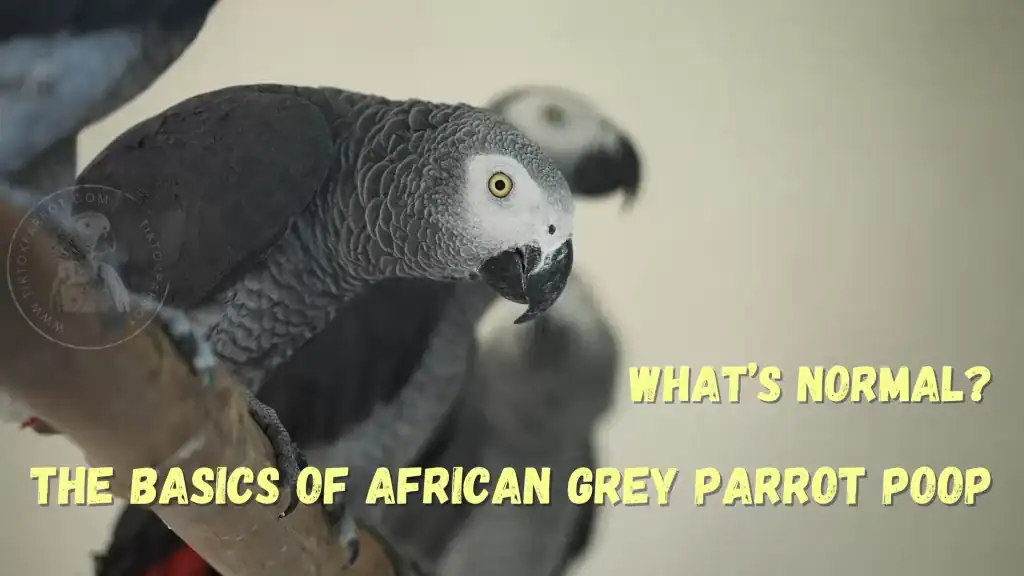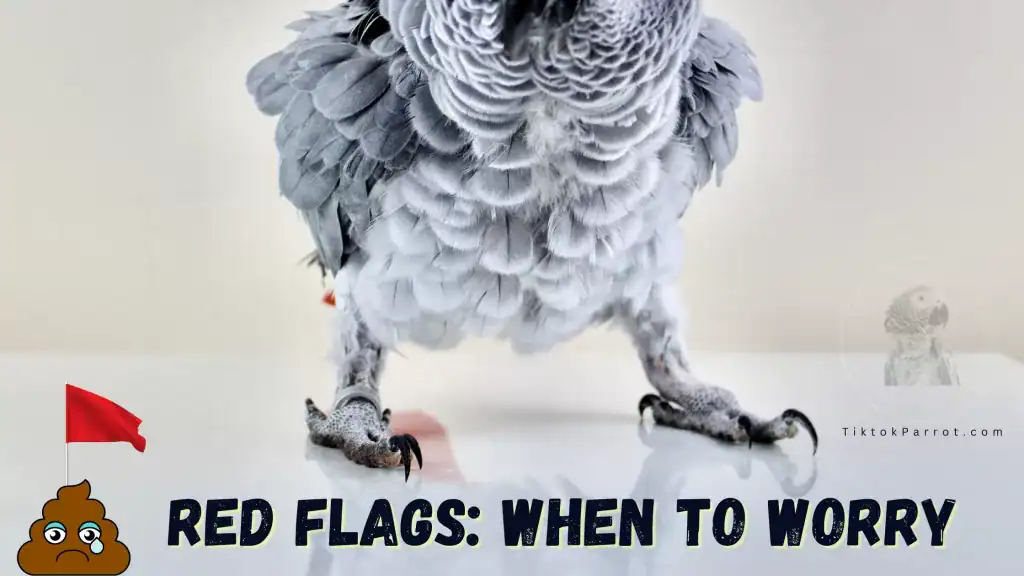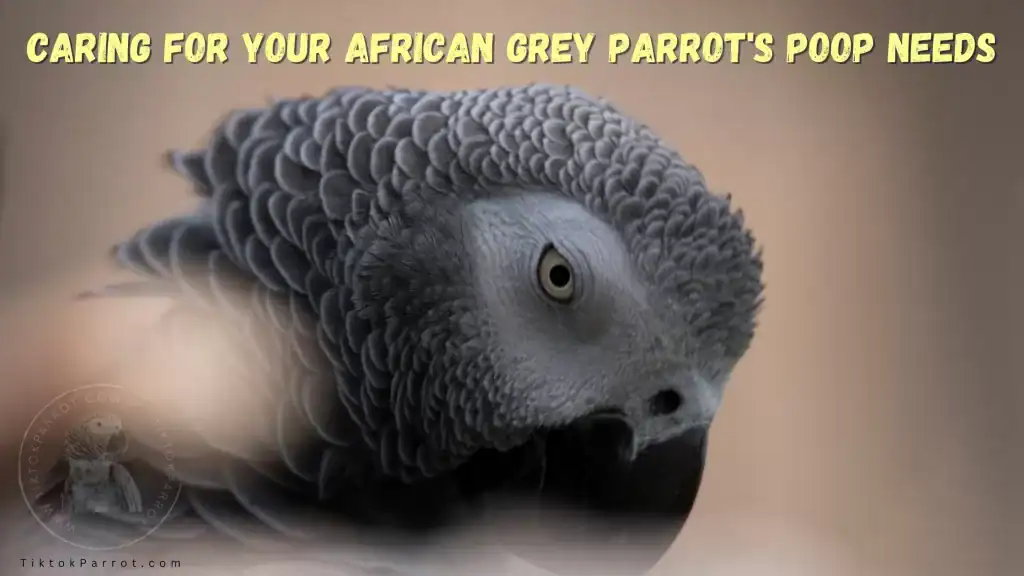When it comes to African grey parrot ownership, there’s more to these magnificent birds than meets the eye. Often overlooked, African grey parrot poop provides valuable insights into their health and well-being.
Discover the captivating world of African grey parrot poop, from understanding the signs of a healthy bird to managing their droppings in a clean and efficient manner.
In this comprehensive guide, we’ll dive into the nitty-gritty of grey parrot droppings, exploring everything from what’s considered normal to tips for maintaining a clean environment. At the end do not miss reading some of the most frequently asked questions about African grey’s poop.
So, buckle up and I would not say grab your coffee in this blog post, and let’s get down to the smelly business!
The Basics of African Grey Parrot Poop
If you’re a pet owner, then you know how important it is to understand your pet’s bodily functions, including their poop. African grey parrots are no exception! In this guide, we’ll take a closer look at grey parrot poop and what it can tell you about your pet’s health.
What’s Normal?
Color and consistency
Healthy African grey parrot poop typically consists of three parts: feces, urine, and urates. The feces should be solid and greenish-brown in color, reflecting the bird’s natural diet. The urine should be clear, while the urates, which are the solidified uric acid waste, should be white or slightly off-white. The consistency should be relatively firm but not too hard or watery.
Healthy African grey parrot poop should have a balanced composition of solid and liquid components. The solid part should be formed and firm, and it should have a consistent color and texture. The liquid part should be clear and without any unusual odor or color.
The color of the solid part can vary depending on the bird’s diet, but it’s usually a dark green or brown color. The texture should be firm, but not too hard or dry, nor too soft or runny. If the solid part of the poop is too soft or runny, it can be a sign of an intestinal infection or a digestive problem.
The liquid part of the poop should be clear, without any foam or bubbles, and it should have a watery consistency. If the liquid part of the poop is thick or has an unusual color or odor, it can be a sign of dehydration, infection, or other health issues.
Overall, a healthy African grey parrot should have regular and well-formed poops, which indicate that the bird is properly digesting its food and is in good health. If you notice any changes in your bird’s poop, such as a sudden increase or decrease in frequency, consistency, or color, it’s important to consult with a veterinarian to rule out any underlying health problems.
Frequency
Birds’ excretion frequency is dependent on their size. The diminutive avian creatures tend to excrete more frequently, with parakeets releasing up to 50 fecal matters within a day. Conversely, larger birds have a lower excretion rate, with only 20 droppings per day.
Avian excretion is a crucial aspect of flight, necessitating a high metabolic rate and rapid digestive processes to minimize any additional weight. Consequently, birds are capable of frequent waste elimination to maintain optimal flight conditions.
For instance, African gray parrots are known to refrain from defecating in their sleeping area or cage, opting to hold it for an extended period. As for their excretion rate outside the cage, they typically release droppings every 20 – 30 minutes, although the timing may vary depending on various factors.
This may vary depending on the individual bird’s diet, age, and overall health. It’s essential to monitor your parrot’s habits to understand their normal frequency.
It’s worth noting that a stressed bird is likely to excrete more frequently, and their fecal matter may be more watery in appearance.
Red Flags: When to Worry
As a responsible pet owner, it’s important to keep an eye on your parrot’s poop. Changes in color, texture, or frequency could be an indication of a health problem.
In this section, we’ll go over the basics of African grey poop, when you need to be worried, and what you can do if you notice any abnormalities.
Changes in color or texture
If you notice a significant change in the color or consistency of your African grey parrot’s poop, it may be an indication of a health problem.
For example, bright green or yellow feces can suggest liver issues, while black or tarry feces may indicate internal bleeding. Similarly, an increase in watery droppings could be a sign of diarrhea, while overly hard droppings could point to dehydration or constipation.
Frequency and volume shifts
A sudden change in the frequency or volume of your parrot’s poop can also be a cause for concern. Increased frequency might be due to stress, illness, or a change in diet, while a decrease in frequency could suggest constipation or a blockage. Be sure to consult an avian veterinarian if you notice any persistent changes in your bird’s droppings.
What Does Normal African Grey Parrot Poop Look Like?
As we discussed this above, normal African grey parrot poop should be firm and well-formed, with a slight curve to it. It should be a greenish-brown color, with a white cap on one end. The white cap is actually urates, which are the solid waste products of your bird’s kidneys. The consistency of the urates should be smooth and firm, not watery or runny.
How Often Should Your African Grey Parrot Poop?
This also we have discussed above, grey parrots should poop about every 20-30 minutes. The amount of poop your bird produces will depend on their diet, but you should expect to see at least one or two droppings every time they go. If you notice that your bird is not pooping as often as usual, this could be a sign of a blockage or other health problem.
What Can Abnormal African Grey Parrot Poop Indicate?
Abnormal African grey parrot poop can indicate a variety of health problems. Here are some of the most common issues to watch out for:
Diarrhea
If your African grey’s poop is watery or runny, this could be a sign of diarrhea. Diarrhea can be caused by a variety of factors, including stress, poor diet, and bacterial infections.
Blood in the Poop
If you notice blood in your grey parrot’s poop, this could be a sign of a serious health problem. Blood in the poop can be caused by a number of issues, including infections, tumors, and internal injuries.
Changes in Color
Changes in color can also be a sign of a health problem. If your African grey parrot’s poop is green or yellow, this could indicate a liver problem. If it’s black or dark brown, this could be a sign of bleeding in the digestive tract.
Changes in Consistency
Changes in consistency, such as watery or extremely dry poop, can also be a sign of a health problem. If you notice any changes in your bird’s poop, it’s important to contact your veterinarian.
Caring for Your African Grey Parrot’s Poop Needs
Cleaning and Maintenance
There are a few things you can do to help keep your African grey parrot’s poop healthy:
Feed Your Bird a Balanced Diet
One of the most important things you can do for your bird’s health is to feed them a balanced diet. This should include a variety of fresh fruits and vegetables, as well as high-quality pellets and seeds.
Provide Clean Water
Make sure your bird always has access to clean, fresh water. Dirty water can lead to bacterial infections and other health problems.
Clean Your Bird’s Cage Regularly
Regular cage cleaning can help prevent the buildup of harmful bacteria in your bird’s environment.
Schedule Regular Veterinary Checkups
Regular checkups with your veterinarian can help catch any health problems early on, before they become more serious.
Cage liners
Cage liners are an essential tool for maintaining a clean environment for your grey parrot. They make cleaning up droppings a breeze, as you can simply remove the soiled liner and replace it with a fresh one. Choose liners made from materials like paper or recycled materials that are safe for your bird and easy to replace.
Poop scoopers and brushes
Having a dedicated poop scooper or brush for your parrot’s cage can make cleaning up droppings even easier. Look for scoopers with a small, flat edge, perfect for scraping off dried droppings, and brushes with stiff bristles to clean the bars and corners of the cage.
Regular cleaning routines
Establishing a regular cleaning routine is essential for maintaining a hygienic environment for your African grey parrot. Remove soiled cage liners daily, and give the cage a thorough cleaning at least once a week using a pet-safe disinfectant. This will help minimize the risk of bacterial buildup and keep your parrot’s living space fresh and clean.
Toilet Training Your Parrot
1. Teaching cues
Toilet training your African grey parrot involves teaching them to poop on command. Start by observing your bird’s natural habits to identify when they’re about to poop. Just before they do, use a verbal cue, such as “go potty,” and praise them once they’ve done their business. Over time, your parrot will associate the cue with the act of pooping.
2. Rewarding good behavior
Positive reinforcement is crucial in toilet training your parrot. Whenever your bird poops on command or in the designated area, reward them with praise or a small treat. This will help reinforce the association between the cue, the action, and the positive outcome.
3. Patience and consistency
Toilet training an African grey parrot or any pet requires patience and consistency. It may take several weeks or even months for your bird to fully understand and consistently respond to the training. Be persistent and maintain a positive attitude throughout the process, and your parrot will be more likely to successfully learn the desired behavior.
Common FAQs about African Grey Parrot Poop
- What should healthy African Grey Parrot poop look like?
Healthy African grey parrot poop should consist of three parts: greenish-brown feces, clear urine, and white or slightly off-white urates. The consistency should be relatively firm but not too hard or watery. - Can African Grey Parrots be toilet trained, and how long does it take?
Yes, African grey parrots can be toilet trained. The process may take several weeks or even months, as it requires patience and consistency. - How often should I clean my parrot’s cage?
You should clean your parrot’s cage daily by removing soiled cage liners and providing fresh ones. A thorough cleaning with a pet-safe disinfectant should be done at least once a week. - What are the signs of a potential health issue related to my African Grey Parrot’s poop?
Signs of potential health issues related to your parrot’s poop include changes in color, consistency, frequency, or volume. Consult an avian veterinarian if you notice any persistent changes. - Can diet affect my African Grey Parrot’s droppings?
Diet can significantly affect your African grey parrot’s droppings, as different foods may cause variations in color and consistency. - Can the color of my African Grey Parrot’s poop change due to the food they eat?
The color of your parrot’s poop can temporarily change due to the food they eat, especially when consuming colorful fruits and vegetables. - How do I know if my parrot’s droppings have an abnormal smell?
An abnormal smell in your parrot’s droppings may indicate an infection or other health issue. If you notice a persistent, foul odor, consult an avian veterinarian. - Are there any specific cleaning products I should avoid using in my African Grey Parrot’s cage?
Avoid cleaning products containing ammonia, bleach, or other harsh chemicals, as these can be harmful to your African grey. Instead, use pet-safe disinfectants specifically designed for bird cages. - Should I be concerned if my African Grey Parrot’s poop has undigested food particles in it?
Occasional undigested food particles in your parrot’s poop may not be a cause for concern. However, if it occurs frequently, consult an avian veterinarian to rule out any digestive issues. - How can I tell if my African Grey Parrot is constipated, and what can I do to help?
To help a constipated African grey parrot, ensure they’re well-hydrated and provide a diet rich in fiber, such as fruits and vegetables. If constipation persists, consult a veterinarian. - Is it normal for my African Grey Parrot’s droppings to change during molting season?
It is normal for your parrot’s droppings to change during molting season, as their body is undergoing significant changes, which may affect their digestion. - Can environmental factors, such as humidity or temperature, affect my parrot’s poop?
Environmental factors like humidity and temperature can affect your parrot’s poop, as changes in their environment can influence their digestion and overall health. - How do I know when it’s time to consult a veterinarian about my African Grey Parrot’s droppings?
Consult a veterinarian about your parrot’s droppings if you notice persistent changes in color, consistency, frequency, or volume, or if you have concerns about their health. - Can stress cause changes in my African Grey Parrot’s poop, and how can I reduce their stress levels?
Stress can cause changes in your parrot’s poop. To reduce their stress levels, maintain a consistent routine, provide a comfortable environment, and offer mental stimulation through toys and social interaction. - How can I monitor my African Grey Parrot’s droppings without causing too much disturbance to their daily routine?
To monitor your parrot’s droppings without disturbing them, observe their habits and note any changes during routine cage cleaning. - What role does hydration play in the appearance and consistency of my African Grey Parrot’s poop?
Proper hydration is crucial for maintaining healthy poop in African greys. Dehydration can lead to hard, dry droppings, while overhydration may result in watery feces. Ensuring that your parrot has access to clean, fresh water at all times helps maintain their overall health and normal poop consistency. - Can a change in my parrot’s daily routine or environment cause alterations in their droppings?
Yes, changes in a parrot’s daily routine or environment can cause temporary alterations in their droppings. Stress, anxiety, or excitement can lead to changes in color, consistency, or frequency. It’s essential to monitor your parrot’s droppings during periods of change and consult a veterinarian if you notice any persistent abnormalities. - How can I differentiate between normal and abnormal urates in my African Grey Parrot’s poop?
Normal urates in African grey parrot poop are white or slightly off-white and solid. Abnormal urates may be yellow, green, or have a gritty texture, which could indicate dehydration, kidney issues, or other health problems. If you notice any changes in your parrot’s urates, consult an avian veterinarian. - Are there any seasonal factors that could affect my parrot’s droppings, such as changes in daylight hours?
Seasonal factors, like changes in daylight hours or temperature fluctuations, can affect a parrot’s metabolism and, subsequently, their droppings. During colder months, a parrot’s metabolism may slow down, leading to a temporary change in the frequency or consistency of their poop. Keep an eye on your parrot’s droppings during seasonal changes and consult an avian veterinarian if you notice any concerning or persistent changes. - How long does it typically take for a change in diet to be reflected in my African Grey Parrot’s poop?
Changes in diet can be reflected in your parrot’s poop within a day or two. However, the exact duration may vary depending on the specific dietary change and your bird’s digestive system. Be sure to monitor their droppings closely after introducing new foods and consult a veterinarian if you notice any concerning changes. - If I suspect my parrot has diarrhea, what steps should I take to help them recover?
If you suspect your parrot has diarrhea, the first step is to consult an avian veterinarian to determine the cause and appropriate treatment. In the meantime, ensure your parrot has access to fresh, clean water and maintain a balanced diet. Avoid giving them any treats or new foods until their condition has improved. - Can an African Grey Parrot’s poop provide any insight into their hormonal or breeding behavior?
African grey parrot poop may not provide direct insight into hormonal or breeding behavior, but monitoring their droppings can help you assess their overall health, which is vital during breeding periods. If you’re planning to breed your parrot, consult an avian veterinarian to ensure they’re in good health. - Is it normal for my parrot’s droppings to be temporarily discolored after ingesting certain fruits or vegetables?
Yes, it’s normal for your parrot’s droppings to be temporarily discolored after consuming certain colorful fruits or vegetables, such as beets or berries. This change should be short-lived, and their droppings should return to their normal color within a day or two. If the discoloration persists or you notice other abnormalities, consult an avian veterinarian. - How can I ensure that my parrot’s cage is set up in a way that facilitates easy poop management and cleaning?
To facilitate easy poop management and cleaning, use cage liners or paper on the cage bottom to catch droppings. Place perches, toys, and feeding stations in such a way that minimizes the spread of droppings throughout the cage. Regularly clean perches and other accessories to prevent the buildup of fecal matter. Establishing a routine cleaning schedule will also help maintain a clean and healthy environment for your parrot. - Are there any specific signs of illness or parasites that can be detected through examining my African Grey Parrot’s poop?
Examining your parrot’s poop can give you insight into their overall health. Signs of illness or parasites may include changes in color, consistency, or frequency of droppings, presence of undigested food particles, abnormal smells, or the appearance of worms or other parasites. If you notice any of these signs or other abnormalities, consult an avian veterinarian for further evaluation and treatment.
My Final Thoughts
African grey parrot poop might not be the most glamorous aspect of pet ownership, but it’s an essential part of keeping your feathered friend happy and healthy. By understanding what constitutes normal droppings, staying vigilant for potential red flags, and implementing a consistent cleaning routine, you’ll ensure your parrot’s environment remains hygienic and safe.
Moreover, toilet training your grey parrot can make life even easier and foster a stronger bond between you and your pet. Lastly, don’t be afraid to consult your avian veterinarian if you notice any unusual changes in your bird’s poop – it’s always better to be safe than sorry.
In the end, it’s clear that African grey parrot poop holds more importance than one might initially think. Embrace the role it plays in your pet’s well-being, and you’ll find that caring for your African grey is a rewarding and fulfilling experience.
If you found this blog helpful, It would be great if you could share it with your family and friends who might find it useful as well.
You might like to read these as well
Top 7 Superfoods for Your African Grey Parrot
Understanding of Grey Parrot’s Body Language
The Battle of the Birds: African Grey Parrot vs Macaw
African Grey Parrot Male or Female? (Determine Gender of African Grey)
Is Your African Grey a Jealous Bird? Here’s What You Need to Know!
The Surprising Benefits of Owning an African Grey Parrot
African Grey Parrots: The Ultimate Guide to Care and Training
For more useful content about African grey parrots, you can subscribe my site with your email to get notification upon publishing a new blog, the subscribe box you can see on the right side of this page. Also if you get an alert on your web browser while browsing my site, allow it and that will also give you an alert whenever I publish a new blog.
Stay safe and much love !








